This story is excerpt from Alabama Footprints Volumes V-VIII: Four Books in One
CHANDELIER FALLS IN ALABAMA CAPITAL
by
Hon. E. A. Powell
The session of 1845 was the last session of the Legislature held at Tuskaloosa. By the constitution of 1819 and the act of the Legislature, the seat of Government was permanently fixed at Tuskaloosa, and could not be changed except by an amendment to the constitution. The constitution also provided for annual elections of members and annual sessions of the General Assembly.
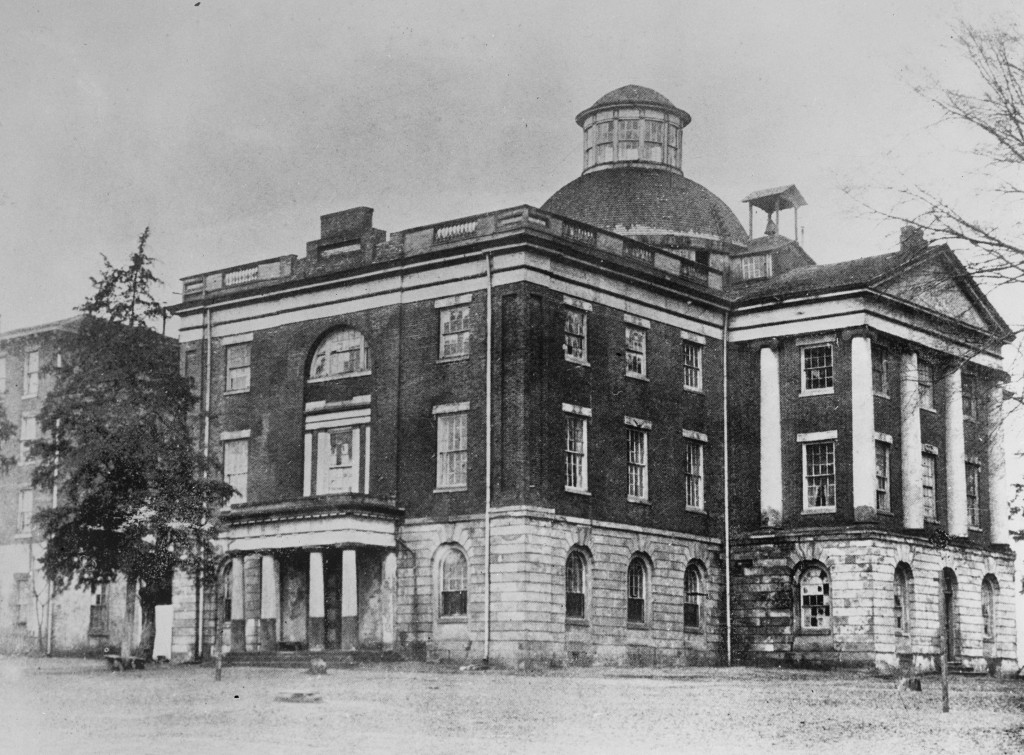 Old Alabama State Capitol building at Tuscaloosa (Alabama Department of Archives and History)
Old Alabama State Capitol building at Tuscaloosa (Alabama Department of Archives and History)
Removal of State capital
The settlement of the Indian Territory, in the eastern part of the State, had given that section greatly increased strength both in the Legislature and in the popular vote. And as that power increased that section began to clamor for the removal of the State capital.
ALABAMA FOOTPRINTS Exploration: Lost & Forgotten Stories (Volume 1)
The first effort made in the direction was at the session of 1838. Mr. Walter H. Crenshaw a rising young man from Butler County, introduced in the House, resolutions calling a convention to revise and amend the constitution. The leading object of those resolutions as to so amend the constitution as to strike out the provision, permanently locating the seat of government. The resolutions passed both Houses, but upon being submitted to the people at the election in 1839, they were voted down, I think by a large majority.
Question to remove remained
The question then slumbered until the session of 1844, when joint resolutions were passed proposing two separate amendments to the constitution to be voted on at the general election of 1843. The first proposed to amend simply by striking out Tuskaloosa as the seat of government. It did not propose to insert any other place. The object of this course was very apparent. If the location was left blank the influence of every section that had the slightest hope of getting the capitol would vote to ratify the amendment. In this way, that proposition secured the Constitutional majority of the votes of the people. But the counties voting against it had elected members enough to defeat a ratification in either house.
Proposed amendment to change to Biennial election & Sessions
The proposed amendment was to change from Annual to Biennial election and sessions of the Legislature. This amendment received a majority in every county in the State except Tuscaloosa. (As I now remember.)
Upon the meeting of the Legislature the friends of removal subordinated every other question to the previous one of removal. In order to catch as many of the anti removal members as possible, they so framed the resolution ratifying the two amendments as to embrace both amendments in one single resolution of ratification.
Give us all or you cannot get any
The opponents of removal made every effort in their power to get a division of the question. The point was ably argued, that the amendment proposed had been voted upon by the people, separately, that in order to a compliance with the constitutional requirement they must be ratified separately. But the speaker Andrew B. Moore held that proposition could not be divided and removal men being in the majority sustained the ruling of the speaker, and the contest was on that basis. Upon the first vote, neither house voted to ratify the amendment as proposed. It was then proposed to ratify the amendment making the elections and sessions Biennial, but the friends of removal said “no gentlemen; you must give us all or you cannot get any.”
Voted for removal rather than not have Biennial sessions
In the meantime motions to reconsider the first vote taken on the ratification resolution had been made and were pending. This action brought up the question to some of the North Alabama members should they lose Biennial session or vote for removal; several of them decided to vote for removal rather than not have Biennial sessions.
ALABAMA FOOTPRINTS – Settlement: Lost & Forgotten Stories (Volume 2)
I have said that all the friends of removal had united to pass the ratification resolution. But after the passage of the ratifying resolution, the removal forces became divided, as there were several places looking to the possible location of the capitol within its limits.
Question as to the new location
When the question of location came up there were eight places voted for all in South Alabama except Huntsville and Tuskaloosa. But in fact none of them were prominent, except Tuskaloosa, Wetumpka and Montgomery; 16 ballots were had by the joint convention, on the 16th ballot vote stood Tuskaloosa 39; Montgomery 68; Scattering 23. So Montgomery having received a majority of all the votes given it was declared to be the future seat of Government for the State of Alabama, and whether the name Alabama really signifies “Here we rest” or not the seat of Government has quietly rested on the banks of the beautiful river of that name for forty years and from present appearance it would seem that it will be many years before its rest shall be disturbed.
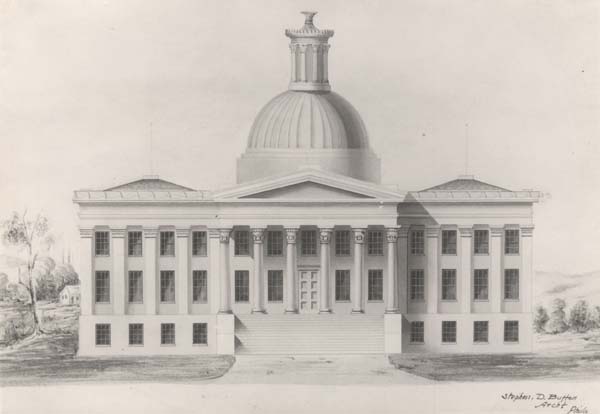 Alabama State Capitol building original plan
Alabama State Capitol building original plan
City of Montgomery promised to erect a House free of charge
The location in Montgomery is certainly a beautiful one. Elevated on a prominent eminance (sic) it overlooks the entire city, and the river making a very short bend at the city, it lies out at the capital as two beautiful rivers, each of which is seen for a considerable distance, and in the old days of Steam Boating the scene on the river was grand. And I do not suppose I hazard anything by saying that the building presents as fine appearance as any building in the country to the cost of it. In addition to its overlooking the city and river above and below the city. You have a beautiful view — certainly presents a grand appearance.
As an inducement to the Legislature to locate the Capital at Montgomery, the city proposed to erect and present to the State free of charge on ground to be obtained by the city, a House and surroundings equal or superior to the one at Tuskaloosa. This was done and before the next meeting of the General Assembly the State Archives were all moved to the new Capitol and all things arranged for the first session of the Legislature at that place.
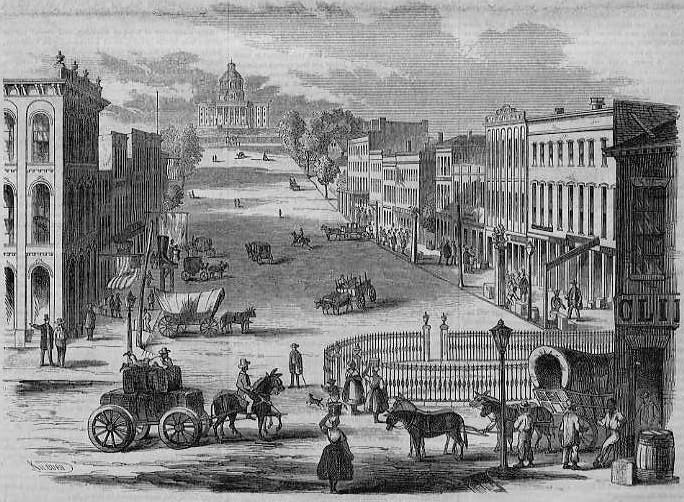 View of Alabama State Capital city of Montgomery
View of Alabama State Capital city of Montgomery
Chandelier fell at first Biennial session
On the first Monday in December 1847, the first Biennial session of the Legislature assembled in the city of Montgomery. Of course, everything was done that a wealthy, liberal and refined population could do to give the event that prominence which the occasion required. And I may here say that the people of Montgomery were not in the habit of allowing themselves to be outdone in such matters. At that session, each of the old parties held their convention preparatory to the Presidential contest, 1848. While the Whig convention was holding a night session the great Chandelier in the centre of the Representative Hall fell with a terrible crash.
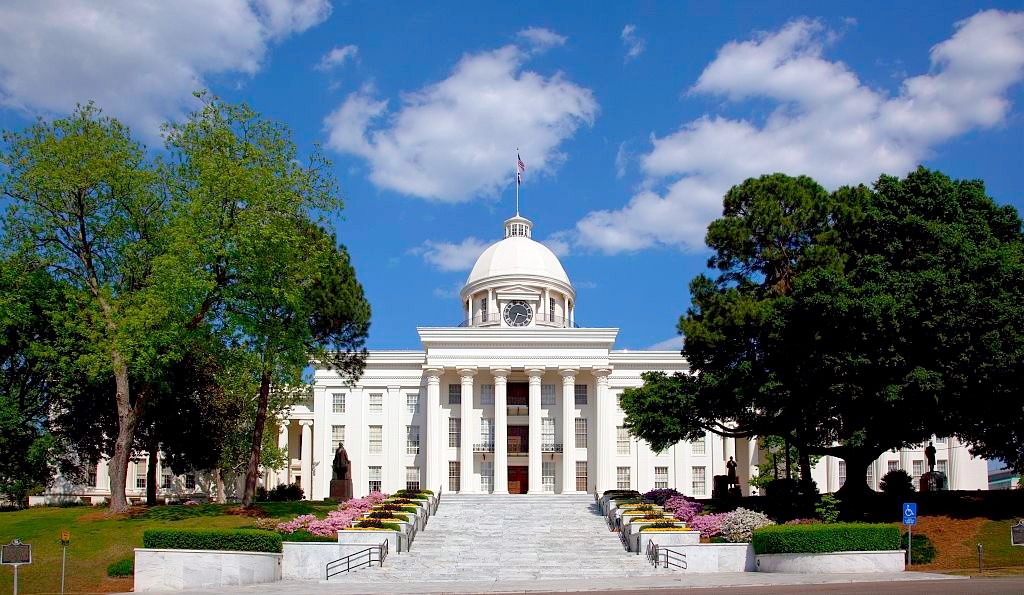 Alabama State Capitol Building in Montgomery, Alabama
Alabama State Capitol Building in Montgomery, Alabama
Fortunately, no one was hurt, but several prominent gentlemen had been together in conversation at the very spot where it fell, but a moment before. Some of the Democratic papers twitted the Whigs on the idea that falling Chandelier was an omen of defeat in the race. But in this, they were mistaken, as we shall hereafter see.
SOURCE
- CHAPTER XXXV (from FIFTY-FIVE YEARS IN WEST ALABAMA by Hon. E. A. Powell printed in the Tuscaloosa Gazette August 12, 1886)


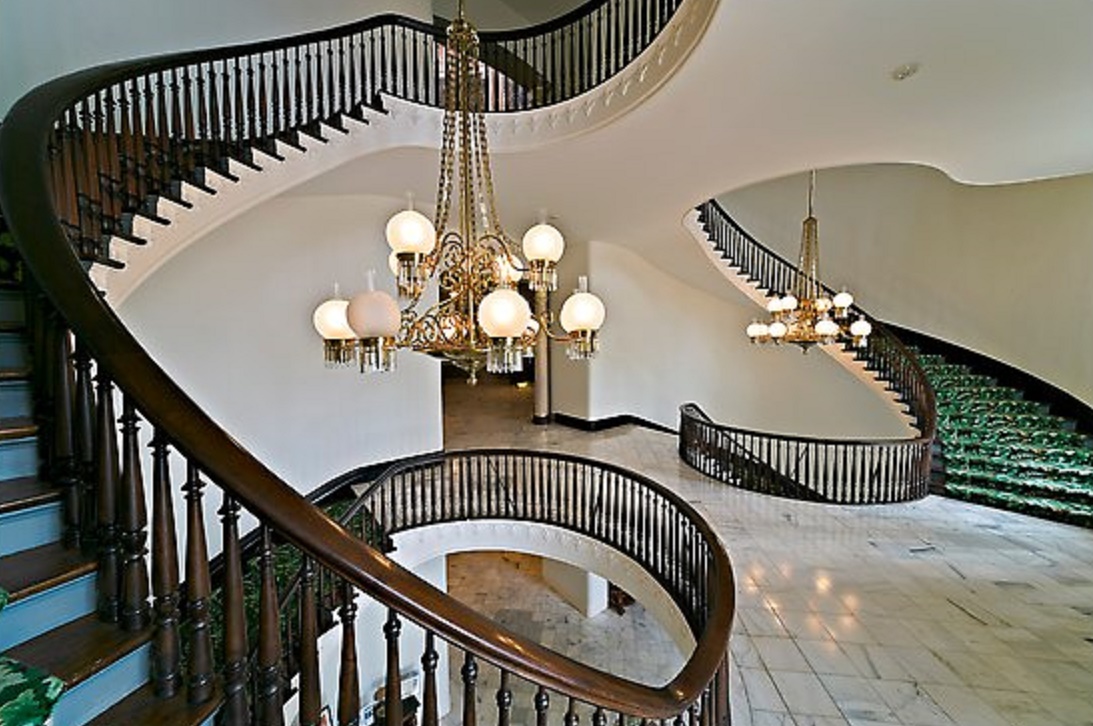
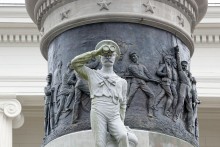
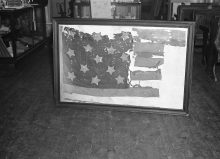
I was disappointed that this account of Alabama’s capital omitted St. Stephens, the FIRST territorial capital.
There are many stories on St. Stephens on the website. Type St. Stephens in the search box to see them. Here is one. http://alabamapioneers.com/st-stephens-1823/#sthash.eCzQdTrO.dpbs
We have many stories on old St. Stephens on the website. You can do a search for the name in the search box on the website. Here is a story about all the capitals of Alabama. http://www.alabamapioneers.com/locating-the-alabama-state-capital/
The real bad omen is that none of the members of the house or the senate were standing under it when it fell. If we can’t vote them out we could at least chandelier them out.
In total agreement with you, Mr. Coley. We need another chandelier to fall in the current fiasco!
The bad omen IS the Alabama legislature being in session. I’m with Harell, too bad the chandelier missed some of our more ambitious legislators.
Uh oh is the tide in trouble???
Margaret Marshall Traylor
Alabama has one of the most beautiful capitol buildings in the Inited States! Everyone should take the time to see it!
Iris indeed a beautiful building